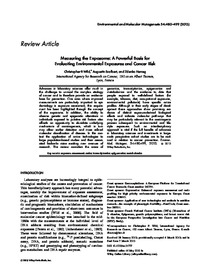Measuring the exposome: a powerful basis for evaluating environmental exposures and cancer risk

Wild, Christopher P. ; Scalbert, Augustin ; Herceg, Zdenko
Environmental and Molecular Mutagenesis
2013
54
7
480-499
cancer ; aetiology ; exposure assessment ; genetic effects ; carcinogenicity
Medicine - Toxicology - Health
http://dx.doi.org/10.1002/em.21777
English
Bibliogr.
"Advances in laboratory sciences offer much in the challenge to unravel the complex etiology of cancer and to therefore provide an evidence-base for prevention. One area where improved measurements are particularly important to epidemiology is exposure assessment; this requirement has been highlighted through the concept of the exposome. In addition, the ability to observe genetic and epigenetic alterations in individuals exposed to putative risk factors also affords an opportunity to elucidate underlying mechanisms of carcinogenesis, which in turn may allow earlier detection and more refined molecular classification of disease. In this context the application of omics technologies to large population-based studies and their associated biobanks raise exciting new avenues of research. This review considers the areas of genomics, transcriptomics, epigenomics and metabolomics and the evidence to date that people exposed to well-defined factors (for example, tobacco, diet, occupational exposures, environmental pollutants) have specific omics profiles. Although in their early stages of development these approaches show promising evidence of distinct exposure-derived biological effects and indicate molecular pathways that may be particularly relevant to the carcinogenic process subsequent to environmental and lifestyle exposures. Such an interdisciplinary approach is vital if the full benefits of advances in laboratory sciences and investments in large-scale prospective cohort studies are to be realized in relation to cancer prevention."
Digital
The ETUI is co-funded by the European Union. Views and opinions expressed are however those of the author(s) only and do not necessarily reflect those of the European Union or the ETUI.